| Article ID | Journal | Published Year | Pages | File Type |
|---|---|---|---|---|
| 4348305 | Neuroscience Letters | 2008 | 4 Pages |
Abstract
Honey bees can distinguish nestmates from non-nestmates, directing aggressive responses toward non-nestmates and rarely attacking nestmates. Here we provide evidence that treatment with pilocarpine, a muscarinic agonist, significantly reduced the number of aggressive responses directed toward nestmates. By contrast, treatment with scopolamine, a muscarinic antagonist, significantly increased attacks on nestmates. Locomotor activity was not altered by these pharmacological treatments. When interpreted in light of known cholinergic pathways in the insect brain, our results provide the first evidence that cholinergic signaling via muscarinic receptors plays a role in olfaction-based social behavior in honey bees.
Related Topics
Life Sciences
Neuroscience
Neuroscience (General)
Authors
Nyla Ismail, Stephanie Christine, Gene E. Robinson, Susan E. Fahrbach,
